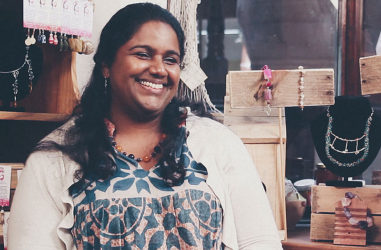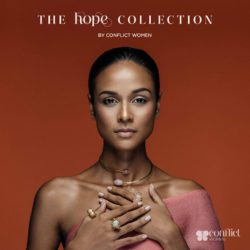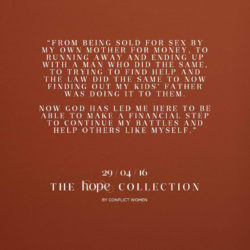The view that brands can actually care about social ills and can be ethical while trying to be profitable is still perceived as a highbrow and elitist marketing ploy. I think this perception partially stems from brands failing to use transparency as a marketing tool, which results in consumers always questioning their integrity.

However, socially conscious business models are becoming more popular and are seen as the model to tailor your brand’s aesthetic around. There is a growing demand for brands to be more ethical and socially conscious as the unprincipled realities that profit a select few continue to be constantly exposed to the consumer. There is also much more pressure to project ‘good person vibes’ on the consumer end, as ‘humble bragging’ apps like Snapchat and Instagram continue to act as ‘social curriculum vitae.’ This week I got the chance to interview Asiya Mohammed, the founder of Conflict Women.
Conflict Women is a social brand based in Trinidad and Tobago that is offering hope to domestic violence and sexual abuse survivors by way of financial empowerment through the creative industries. Conflict Women provides training in jewellery making, entrepreneurship and also conflict transformation. Conflict Women markets the products made by the survivors, offers them a monthly income and also free retraining.

Asiya said the social business is necessary for so many reasons; it is also part of her healing process as she, too, grew up exposed to domestic violence in her household.
Ashma: What does Conflict Women represent?
Asiya: Conflict Women was founded in 2014 and it’s a social business whose mandate is to financially empower survivors of domestic and sexual violence by providing a monthly income in exchange for jewellery created by the survivors. Many times over, what we see happening in abusive relationships, is that the woman stays because she is not financially secure. So we have a system whereby poverty and a lack of opportunity contribute to reinforcing the cycle of abuse. Our mandate lies solely in helping these women gain financial independence to help break free of this cycle. We host workshops for the survivors to learn different skills including business entrepreneurship and we also offer the tool kits to help get them started.
Ashma: One of the main problems with social businesses that choose to incorporate fashion is that they lack lustre. The jewellery offered by Conflict Women is very much on trend. Do you control the design process and can you expound on how it works?
Asiya: Whilst we encourage the women to offers their ideas, yes we do control certain elements of the design process. It’s mostly spearheaded by myself and Shauna Danae Grant who works with the brand. It is important that your pieces are competitive on the market. Offering a well done product is still crucially important for a social business to work and also to be profitable. It must be desirable in order to gain continuous support. We take great pride in ensuring our pieces are on trend, sturdy, quality assured and that they can stand the test.

Ashma: How important would you say is fashion’s role in society where social ills are concerned?
Asiya: I think that fashion is pivotal as we move forward as a society. I will give you a couple of examples on why I think so. I have a background in foreign policy, human rights and conflict transformation to name a few and I have also travelled a great deal. A lot of the work I did was based in Africa. I had an up-close view of how our actions can seriously affect others. What takes place in the mines is unethical for what we perceive to be so beautiful. Miners could be paid less than five dollars a day to risk their lives. The demand for those diamonds fuels human rights violations and we need to care about what goes on behind the scenes with the products we desire and buy into. We must be made aware how our clothes are being made. Is it made by a child or woman who is being made to work to under inhumane conditions? Fashion is very important and it allows us to bridge many gaps. But we need the truth behind where our products come from and whose rights are being marginalized. I like to call this whole thing the political economy of human rights. Fashion plays into many unethical practices and we must find ways to make it better. We must start somewhere.
Ashma: How important is transparency for a social business and do you believe transparency can change the way we consume, especially in the digital age where the attention span is so short?
Asiya: Transparency is really important, especially if we want to address key problems. I like to think that the world is made up of good people and that we can all truly be the drivers of change, if we all do our bit. If we are aware of the consequences, I personally believe we would make better decisions in the future. Our generation, the millennials are aware of what we are consuming and who are benefiting. I believe once transparency becomes more evident the way we consume will change. A great point to note in all of this, is that the creative shoot for the Hope Collection was sponsored by people who were moved by the story of the brand, from the creative director to make-up-artist to photographer to stylist. We are all people who don’t accept the status quo of this epidemic and we are all interested in changing that. Fashion brought that together.
Ashma: Violence against women is a huge social ill in other Caricom countries like Guyana and Jamaica. Will Conflict Women be looking to network and develop the model outside of Trinidad and Tobago?
Asiya: Definitely! We are looking to export the model regionally and internationally. Networking is critical for its development. However, there are challenges that we have to get by first to make that possible. More funding would be great! But we are definitely working toward that direction. I have started mapping out prospects but unfortunately I can’t share all the details with you just yet until everything has been cemented.
Ashma: We still have a very uniform way in which we approach fashion in the Caribbean. This has something to do with colonialization and religion to an extent. Our approach to fashion is also one that promotes rape culture. Will actively challenging these societal values, since fashion and the creative industries are interlinked with them, help in changing these perceptions?
Asiya: We are aware of how they are interlinked. We issued a press statement in the case of Asami Nagakiya, the Japanese girl who was murdered, about whom the then Mayor [said] women should carry themselves more appropriately. As much as we would like to fix the many problems, it is important for us to remember our mandate which is the financial empowerment of survivors of domestic violence. We are challenging perceptions, even by our name. A lot of men are curious, even shocked when they read our product tags; as the tags attached to the jewellery also carry the stories of the survivors. We must remember that domestic abuse is a very sheltered issue and often considered a ‘family matters.’ So while we would like to challenge everything we must do so systematically and strategically.
Ashma: How do you feel about designers who choose to use social issues as marketing band aids for publicity?
Asiya: My reaction to that is two-fold. Social issues, environmental issues etc, affect us all in some way. While it may not affect us directly, it can affect people close to us. I don’t necessarily think all is done for marketing purposes. Secondly, good publicity is publicity and bad publicity is also publicity. Highlighting the issues is what’s important to me. We need to start the conversation at some point for change to come. I, however, would also like to say that the artists need to play a much more conscious role when it comes to speaking out about social issues. It’s really starting to fade. I really admired the way Bob Marley used his platforms to engage his audience.
Ashma: The Editor of Business of Fashion, Imran Amed, published a post recently on Beyoncé’s new visual album ‘Lemonade.’ Most of it surrounded fashion’s inability to attract awareness to hot topics and Beyoncé’s ability to do so. What plans does Conflict Women have in store to bring attention to the epidemic you are working around?
Asiya: Well we currently releasing parts of our Lookbook onto our social media platforms such as Facebook and Instagram and to be frank we are still working towards marketing the brand but that entails talking about the uncomfortable. What you can expect is much more fantastic marketing strategies from us. We are constantly working.
Ashma: How many collections have you had in the past and how often do you release a collection?
Asiya: We have had a total of three collections. The Hope Collection is the most recent one. Our goal is to release two collections per year, but we will have additions made to our stock as we go along.
Ashma: What are your retail channels and how would you say Conflict Women has evolved from the first collection to now?
Asiya: We currently retail at The Shop at Normandie Hotel, Akimbo in Arima, local markets like UpMarket and on our e-shop, www.conflictwomen.com. I would say all the collections were successful but Hope has done extremely well. We learnt between the gaps. The skills have increased and it shows in the work. They are way more intricate and I would like to think the evolution parallels itself with the how these women have evolved out of their situations.
While social fashion businesses are still much of a foreign concept to fashion, they hold much hope for finding solutions for poverty-stricken countries like Guyana, as global consumers become more informed. They are also the business model that will earn faster street cred because of their good nature.
Asiya Mohammed studied at the London School of Economics and Political Science and Lehigh University in Pennsylvania. She holds an MSc in Comparative Politics (Markets and Politics) and BA in International Relations. Her recent work experience lies with UNICEF Geneva, USAID, DPK Consulting and the Ministry of Foreign Affairs in Trinidad and Tobago.





